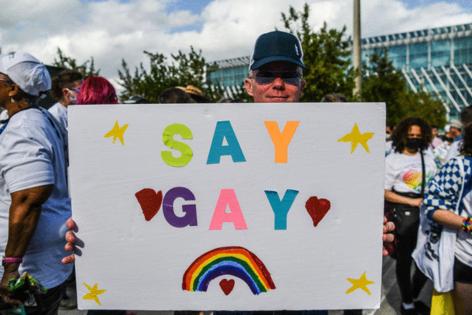Heidi Stevens: University of North Texas bans 'race,' 'gender' from course titles. What will the free speech on campus folks have to say?
Published in Lifestyles
Not so long ago (this year), in a land not so far away (this one), a debate roiled fiercely about free speech on college campuses.
On one side, students, faculty and interested observers advocated for safe spaces for marginalized groups and trigger warnings on certain materials and protested loudly when speakers whose ideas they abhorred were invited to campus.
On the other side, students, faculty and interested observers warned about the chilling effect of such measures, arguing that college is where you go to encounter and examine and interrogate all sorts of ideas, even those that make you uncomfortable.
Broadly speaking, for what it’s worth, I agree with both sides. I do think college is where you go to encounter and examine and interrogate all sorts of ideas, even those (especially those) that make you uncomfortable. I also think one of those ideas might be trigger warnings on certain materials. Or safe spaces for marginalized groups.
I think campuses can and should platform speakers from all different political and religious and cultural backgrounds. I also think students can and should use their First Amendment rights to protest loudly when those speakers espouse views they abhor.
And because it’s college and minds are still growing and personalities are still being shaped and comfort zones are still being left and blind spots are still being revealed and lived experiences are still being racked up, I tend to think we should give students a wide berth for mistake-making and course-correcting and all the things that teach us, outside of a classroom, who we are and what we want to contribute to the world.
But what I have a hard time reconciling is why the folks who tend to be the angriest about the rise of safe spaces and trigger warnings and campus protests tend to clam up when officials—campus officials, government officials—move to limit what parts of our nation’s history students are allowed to be taught. Or whose stories students are allowed to read. Or how students are allowed to identify.
How, for example, do book ban attempts—which are at an all-time high—square with cries about a chilling effect? How does “Don’t Say Gay” square with calls to protect free speech? How does Florida’s legislation banning critical race theory because no lessons should make students "feel guilt, anguish or other forms of psychological distress" (it’s in the bill ) square with the push for students to encounter uncomfortable ideas?
They don’t.
Which brings us to the University of North Texas, where officials just removed the words “race,” “gender,” “class” and “equity,” among others, from course titles and descriptions in an attempt to comply with the state’s diversity, equity and inclusion ban.
“The College of Education is currently conducting its state-mandated curriculum alignment review to ensure its curriculum is in line with teacher education standards as required by the state,” UNT spokeswoman Devynn Case wrote in a statement to The Dallas Morning News. “In response to the review, we are updating course names, content, readings, etc. to align with the state’s standards for the training of teachers.”
Texas Senate Bill 17, which went into effect in January, bans diversity and inclusion programs in public universities.
“If a change is being made to your course, there were problems related to SB 17 and the new charge in the new legislative session,” faculty member Bill Camp emailed colleagues on Oct. 28, according to the Dallas Morning News.
PEN America, which champions free expression in the United States, called the course renaming “an example of extreme overcompliance with the law’s mandate.”
The Texas Conference of the American Association of University Professors (which is affiliated with the Texas American Federation of Teachers), the Texas Faculty Association and the Texas Association of College Teachers called for the immediate suspension and reversal of all course changes.
“There is simply no excuse for this blatant censorship,” Brian Evans, president of Texas AAUP-AFT, said in a statement. “It is self-inflicted harm that is already seeding a culture of fear and compliance out of fear of reprisal among faculty and that will deny students a rigorous and challenging academic environment and needlessly damage the reputation of this university.”
So will this move reignite the roiling debate about free speech on college campus?
Or will it be met with a lot of disaffected shrugs or, worse, a sense of satisfaction that the libs and their diversity initiatives have been owned?
It ought to send a chill down the spine of every person who cares about free speech and free expression. It ought to inspire outrage from the same folks who claim classrooms and campuses are filling up with coddled young people who can’t abide uncomfortable topics.
Because if you’re OK with a public university in the nation’s second largest state banning words like “race,” “gender” and “class” from its course titles—words that help us understand our past, our present, our policies, our priorities, our population—then it’s hard to believe it’s a robust exchange of ideas you’re pushing for.
It sounds more like you’re pushing for unsafe spaces, particularly for groups who’ve been historically marginalized and underrepresented on campuses. And that’s a path that takes us nowhere good.
©2024 Tribune News Service. Distributed by Tribune Content Agency, LLC.
























Comments